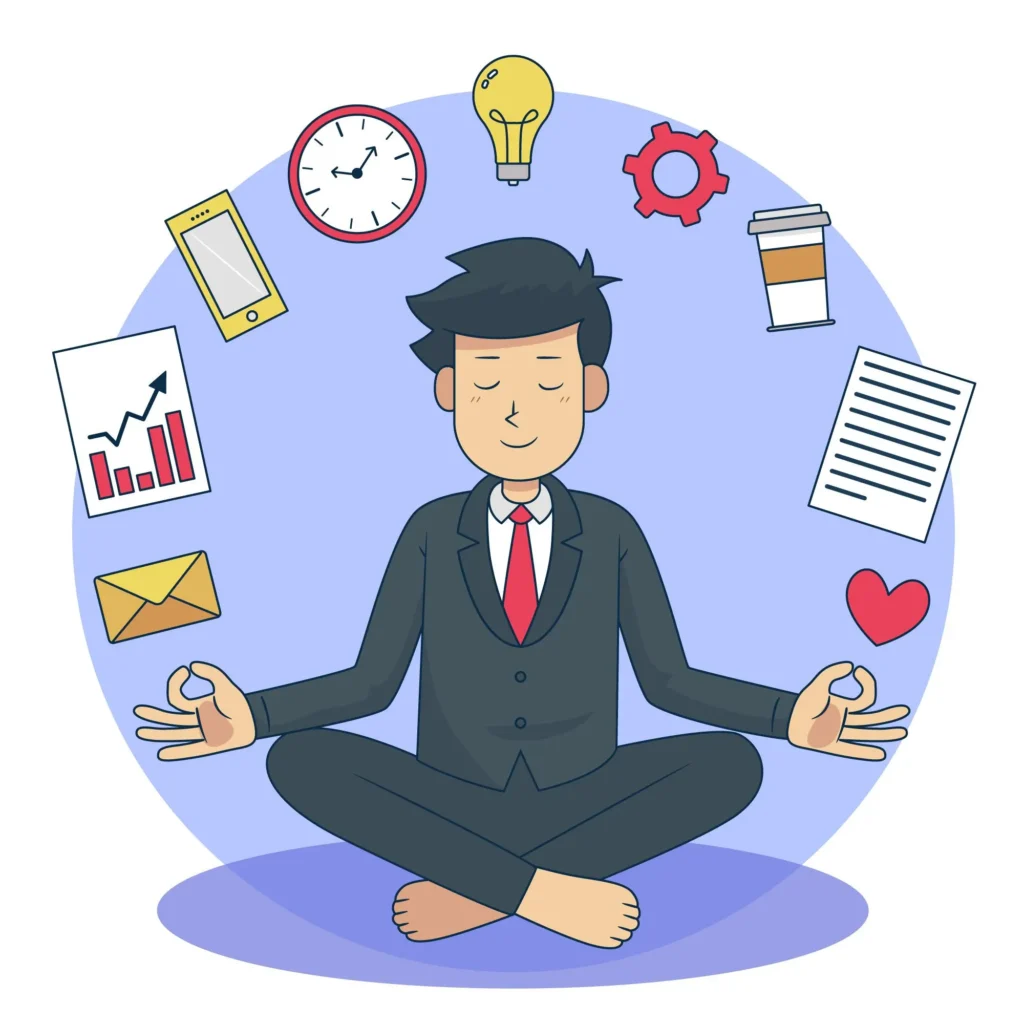Estimated Reading Time: 10-12 minutes (2,137 words)
Introduction
In 2025, the world has become more connected than ever, yet many people still struggle with mental health challenges, including stress, anxiety, and lack of motivation. With our busy lifestyles, it can be easy to forget the importance of maintaining a healthy mindset. However, small habits can make a huge difference in our overall well-being.In this blog, we’ll explore 5 simple habits that you can implement in your life today to cultivate a healthier mindset in 2025. Whether you’re looking to improve your mental health, boost productivity, or find more peace in your daily routine, these habits are easy to adopt and incredibly effective.
A healthier mindset doesn’t require drastic changes—it’s all about incorporating small, sustainable habits that promote long-term well-being.
Mental health challenges are on the rise globally, with millions of people experiencing anxiety, depression, and stress. The pressures of work, family, and personal life can take a toll on our emotional health, leading to burnout, fatigue, and decreased motivation.In fact, according to a study by the World Health Organization, mental health disorders are the leading cause of disability worldwide. But the good news is that we can combat these challenges by incorporating simple, healthy habits into our daily routines.

In this blog post, you’ll learn how to incorporate 5 simple habits into your life that will help improve your mindset, mental health, and overall well-being in 2025. These habits are based on psychological research and have been proven to lead to healthier, more positive thinking.
Habit 1: Start Your Day with Gratitude
One of the easiest ways to improve your mindset is to practice gratitude. Starting your day by acknowledging the things you’re thankful for can set a positive tone for the rest of your day. Research shows that practicing gratitude can lead to reduced stress, improved mental health, and a boost in overall happiness.
How to Do It:
- As soon as you wake up, take a moment to think about three things you are grateful for.
- These can be simple things like a good night’s sleep, a supportive family, or the opportunity to start a new day.
- Keep a gratitude journal to record your thoughts each day.
By consistently practicing gratitude, you will train your brain to focus on the positive aspects of your life rather than dwelling on the negatives.

Habit 2: Prioritize Physical Activity
Exercise isn’t just for physical health—it’s also crucial for your mental well-being. Regular physical activity has been shown to reduce anxiety, depression, and stress by promoting the release of endorphins (the body’s natural mood elevators).
How to Do It:
- Aim for at least 30 minutes of exercise per day, whether it’s walking, running, yoga, or dancing.
- Incorporate movement into your routine, such as stretching before bed or taking the stairs instead of the elevator.
- Find activities you enjoy to make exercise feel less like a chore.
The key is consistency. Even small amounts of physical activity can have a significant impact on your mental health.
Habit 3: Practice Mindfulness and Meditation
Mindfulness and meditation are powerful tools for cultivating a healthier mindset. These practices help you become more aware of your thoughts and emotions, allowing you to stay grounded and manage stress more effectively.
How to Do It:
- Start with just 5-10 minutes of meditation each day. Use apps like Headspace or Calm to guide you.
- Practice deep breathing exercises when you feel overwhelmed or anxious.
- Throughout the day, take a few moments to pause, observe your surroundings, and focus on the present moment.
Studies show that mindfulness and meditation can lower cortisol levels, improve concentration, and increase overall emotional resilience.
Habit 4: Focus on Positive Self-Talk
The way you talk to yourself has a profound effect on your mindset. Negative self-talk can lead to feelings of inadequacy, while positive self-talk can help you build self-esteem and encourage a growth mindset.
How to Do It:
- Pay attention to the way you speak to yourself, especially during stressful situations.
- Replace negative thoughts like “I can’t do this” with positive affirmations such as “I can handle this.”
- Practice self-compassion by acknowledging your efforts and progress, even if things don’t go perfectly.
Over time, this habit will shift your internal dialogue to be more encouraging and motivational.
Habit 5: Build Strong Social Connections
Human beings are social creatures, and our relationships play a vital role in our mental health. Strong social connections provide support, improve emotional well-being, and help you navigate life’s challenges.
How to Do It:
- Spend quality time with friends and family members.
- Join groups or clubs that align with your interests to meet new people.
- Practice active listening and show empathy toward others.
Whether it’s a support group, close friends, or even coworkers, nurturing positive relationships will create a strong network to lean on when you need it.
Key Facts & Statistics Box
- 70% of adults in the U.S. report experiencing stress or anxiety, but practicing gratitude can reduce stress levels by up to 23%. (Source: Mayo Clinic)
- Exercise can boost mood and decrease symptoms of depression and anxiety by 30-50%. (Source: National Institute of Mental Health)
Mindfulness meditation has been shown to improve focus and reduce anxiety by 40-50% in just 8 weeks of consistent practice. (Source: American Psychological Association)
FAQs Section
1- How long should I practice mindfulness each day?
Start with just 5-10 minutes a day to avoid feeling overwhelmed. Mindfulness is about quality, not quantity, so even a short period of focused breathing or presence can be transformative. As you grow more comfortable with the practice, you can gradually extend the time to deepen your connection with the present moment. The key is consistency, not duration, so aim to make it a regular part of your routine.
2- Can I practice gratitude if I’m feeling down?
Absolutely! Gratitude has a profound impact on mental health, especially when you’re feeling low. Even on tough days, finding small things—like a warm cup of tea, the sound of rain, or the love of a friend—can help shift your mindset. Practicing gratitude redirects your focus from what’s going wrong to what’s still going right, fostering a sense of appreciation and balance. It’s a small habit that can lead to significant emotional and psychological healing.
3- How can exercise improve my mental health?
Exercise plays a crucial role in mental well-being by stimulating the release of endorphins, the body’s natural mood elevators. Regular physical activity not only improves physical health but also combats the symptoms of anxiety and depression. It helps reduce cortisol (the stress hormone) levels, stabilizes mood, and enhances cognitive function. Beyond the physical benefits, exercise also promotes better sleep, sharpens focus, and provides a sense of accomplishment, contributing to a healthier, more positive mental state.
4- What is positive self-talk, and why is it important?
Positive self-talk is the practice of challenging and replacing negative, self-critical thoughts with supportive, empowering statements. It’s an essential tool in building confidence, resilience, and a growth mindset. By consciously cultivating positive self-talk, you reframe challenges as opportunities for growth rather than obstacles. Over time, this shift helps to foster greater self-compassion, reduce stress, and create a mindset oriented toward achievement and self-improvement.
5- How do I know if I’m practicing mindfulness correctly?
Mindfulness is about cultivating awareness and non-judgmental acceptance of the present moment. If you find yourself focusing on your breath or simply observing your thoughts, feelings, and sensations without trying to change them, you’re practicing mindfulness correctly. It’s not about achieving a “perfect” state of mind but about being present and accepting each moment as it unfolds. If you’re consistently bringing your awareness back to the present moment, even when distractions arise, you’re on the right track.
6- Is it possible to develop a healthier mindset if I have a busy schedule?
Absolutely! Developing a healthier mindset doesn’t require hours of commitment each day. Simple habits like practicing gratitude in the morning or before bed, spending a few minutes focusing on your breath during breaks, or using affirmations when stressed can easily be incorporated into even the busiest of schedules. The power lies in consistency—small actions add up over time, significantly shifting your mindset and mental health without requiring major lifestyle changes.
7- What if I don’t enjoy traditional forms of exercise?
If traditional forms of exercise don’t appeal to you, it’s essential to find activities that feel enjoyable and accessible. The key to maintaining a regular fitness routine is finding something that excites you, whether it’s dancing, hiking, cycling, or even gardening. The physical and mental benefits of movement are powerful, but the activity should be something that feels rewarding and fulfilling. Discovering activities you genuinely enjoy makes exercise a natural part of your life rather than a chore.
8- Can social connections really improve mental health?
Yes, social connections are one of the most important factors in maintaining good mental health. Healthy, supportive relationships provide emotional resilience, reduce stress, and foster a sense of belonging. Having people you can turn to in times of need helps buffer against mental health challenges such as anxiety and depression. Strong social networks also promote better coping mechanisms, and the act of connecting with others—whether through shared laughter, conversation, or experiences—has been shown to enhance mood and overall well-being.
9- How can I improve my self-talk when I’m stressed?
Stress often triggers a cascade of negative thoughts that can feel overwhelming. The key is to interrupt these patterns by consciously practicing positive self-talk. Start by recognizing when negative thoughts arise and then actively replace them with empowering affirmations or calming statements. For instance, instead of thinking, “I can’t handle this,” replace it with, “I am capable, and I can handle this one step at a time.” This small shift can help you reframe stress and build mental resilience.
10- Do I need to practice all these habits every day?
While daily practice yields the most consistent and profound results, even occasional practice can still offer significant mental health benefits. Integrating these habits—whether it’s mindfulness, gratitude, or self-talk—into your daily life can be transformative, but don’t be discouraged if you miss a day. The benefits of these practices compound over time, so even practicing them a few times a week can still have a positive impact on your overall well-being. Start where you can and gradually build consistency.

Summary & Key Takeaways
In 2025, mental well-being has become just as important as physical health. With rising levels of stress, anxiety, and burnout, cultivating a healthy mindset isn’t a luxury — it’s a necessity. The good news is that a positive, resilient mindset doesn’t come from drastic life overhauls but from small, consistent habits that strengthen emotional balance and self-awareness over time.
Practicing gratitude shifts focus from problems to possibilities, rewiring the brain toward positivity. Regular physical activity not only boosts mood through endorphins but also reduces symptoms of anxiety and depression by up to 50%. Mindfulness and meditation foster calm and clarity, helping you manage stress and stay grounded in the present. Positive self-talk builds self-compassion and resilience, while strong social connections provide emotional support and a sense of belonging — key elements for mental strength and long-term happiness.
Together, these five habits create a powerful framework for lasting mental wellness. Even in the midst of busy schedules and digital distractions, integrating a few mindful minutes of gratitude, movement, reflection, or connection each day can profoundly improve your emotional health.
In essence, a healthier mindset in 2025 is built not through perfection, but through persistence — one small, intentional habit at a time. The more you nurture gratitude, mindfulness, movement, positivity, and connection, the stronger and more balanced your mind becomes — empowering you to handle life’s challenges with greater peace and purpose.
Conclusion
A healthier mindset in 2025 doesn’t require drastic changes—it’s all about integrating simple habits that promote mental well-being. From practicing gratitude to exercising regularly, these habits help you manage stress, improve your mood, and stay focused on the positive aspects of life. Start implementing these habits today, and watch how they transform your mental health for the better.
References & Sources
- World Health Organization (WHO, 2024) – Mental Health: Strengthening Our Response.
https://www.who.int/news-room/fact-sheets/detail/mental-health-strengthening-our-response
→ Reports that mental health disorders are now the leading cause of disability worldwide, emphasizing the importance of daily mental wellness practices. - Mayo Clinic (2024) – The Power of Gratitude and Positive Thinking.
https://www.mayoclinic.org/healthy-lifestyle/stress-management/in-depth/gratitude/art-20046411
→ Shows that practicing gratitude reduces stress levels and promotes long-term happiness and emotional stability. - National Institute of Mental Health (NIMH, 2024) – Exercise for Mental Health.
https://www.nimh.nih.gov/health/publications
→ Finds that regular physical activity can decrease symptoms of anxiety and depression by 30–50%, supporting mental clarity and mood balance. - American Psychological Association (APA, 2023) – The Science of Mindfulness: What We Know and What We Don’t.
https://www.apa.org/monitor/2023/10/mindfulness-research
→ Highlights that mindfulness-based practices reduce stress hormones (like cortisol) and improve focus and emotional regulation within 8 weeks. - Harvard Health Publishing (2023) – Positive Thinking: Stop Negative Self-Talk to Reduce Stress.
https://www.health.harvard.edu/mind-and-mood/positive-thinking-stop-negative-self-talk-to-reduce-stress
→ Explains how reframing negative thoughts into positive affirmations strengthens self-esteem and reduces chronic stress. - University of Oxford (2024) – The Role of Social Connection in Mental Health.
https://www.ox.ac.uk/news
→ Reveals that strong social relationships can increase emotional resilience and lower the risk of depression and anxiety by up to 40%. - American Journal of Lifestyle Medicine (2024) – Integrative Approaches to Building a Resilient Mindset.
https://journals.sagepub.com/home/ajl
→ Supports the role of gratitude, exercise, mindfulness, and connection as key pillars of modern mental wellness routines.







